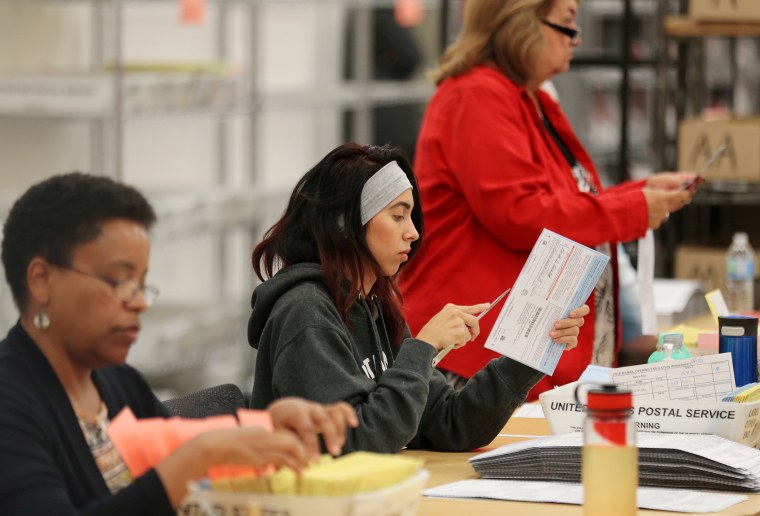WASHINGTON — A surge of mail-in votes and a potential Senate runoff could force Americans to wait days — or more — to learn who won control of the White House or Congress this November.
Experts are alarmed by the lack of readiness in some states to efficiently process an expected surge of mail-in ballots. Swing states like Pennsylvania and Michigan haven’t historically dealt with large-scale mail-in voting and are constrained by rules saying mailed ballots cannot begin to be counted until Election Day.
President Donald Trump carried the two states by razor-thin margins in 2016 before he was projected to be the winner late into the night. But this fall, experts warn that hours could turn into days as state officials frantically verify signatures and tally up mailed ballots that could tilt the result.
“There is no chance that we will know on election night the full vote total in Michigan,” Marc Elias, an election lawyer with prominent Democratic clients, told NBC News. “Neither Michigan nor Pennsylvania have a history of large numbers of absentee ballots being cast. And Michigan law prohibits the absentee ballots from even starting to be counted until polls are closed.”
“People should expect that in November there are going to be absentee ballots and mail ballots that are counted well into the evening and in the days that follow,” Elias said.
The uncertainty comes at a volatile moment of hyper-partisanship and growing unrest in the United States, as the coronavirus pandemic pushes the economy into a recession and protests against the killing of George Floyd in police custody make international headlines. In a volatile political climate, some worry that delays could lend credence to attempts to undermine confidence in the outcome.
The vote-counting restrictions aren’t a problem when absentee ballots are a small slice of the pie. But they could cause extensive backlogs in light of new projections that mail-in voting will explode to more than half of all ballots cast — potentially numbering in the millions — because of the pandemic.
“It’s going to be a huge increase,” said Matthew Weil, the director of the Elections Project at the Bipartisan Policy Center, a think tank based in Washington. “If they can’t even start until Election Day or after the polls close, it’s going to be a long wait from two pretty key swing states in determining the outcome.”
Elias said Michigan and Pennsylvania would be wise to change their “antiquated” rules to enable timely processing of the votes, saying there is “no reason from an election administration standpoint not to start counting those before Election Day.”
A 'majority-making' Senate runoff?
Wisconsin, another swing state, offered a cautionary tale when it held a primary on April 7 in the middle of the pandemic and didn't announce the results for six days. A report by the Bipartisan Policy Center found that 73 percent voted by mail, and projected a similar scale-up for a general election, when the number of votes is expected to swamp that of the primary.
The last time Americans had to wait past sunrise to learn the result of a presidential election was 2000, one of the closest elections in U.S. history that was settled one month later by the Supreme Court.
And while the U.S. potentially awaits the result of the presidential race, it may have to wait for an extra two months to find out which party will run the Senate.
It’s not just vote counting that could delay a quick verdict. There’s also the matter of Georgia.
A special election in Georgia for the Senate seat held by newly appointed Republican Kelly Loeffler appears headed for a “jungle primary” on Election Day with a flurry of candidates from several parties on the same ballot. If none reaches 50 percent, there’ll be a runoff on Jan. 5, 2021.
“This race is absolutely going to go to a runoff because of the sheer number of candidates,” said Jessica Taylor, the Senate editor of the Cook Political Report, a nonpartisan election forecaster. “This could be a majority-making seat.”
If Biden wins the presidency, Democrats will need to gain three seats to take control of the chamber.
They’re likely to lose one in Alabama, which means they’ll realistically need four seats. Contests in Arizona, Colorado, Maine and North Carolina are rated “toss-up” by the Cook Political Report. If Democrats win three of those races, Georgia could decide whether they win control.
Conversely, if Trump hangs on for a second term, Republicans will need to limit their net losses to three seats to hang on to the Senate. Again, Georgia could tip the balance on Jan. 5.
Baseless claims of fraud
Trump has touted conspiracy theories that large-scale mail-in ballots will lead to fraud, which have taken hold among his strongest supporters even though voter fraud is extremely rare and has no known connection to absentee voting.
The president has also expressed fear that mail-in voting will hurt his prospects for re-election and "lead to the end of our great Republican Party."
A recent study by Stanford University found that mail-in voting has no net benefit to one party's turnout or vote share over the either.
It's enough to worry Democrats about how he'd react to defeat.
"I think the greatest risk in post-election disputes is that Donald Trump loses the election and makes up false claims of fraud," Elias said. "This is a person who, after he won the presidency, was lying and saying that there were 3 million illegal votes cast in California and that’s why he lost the popular vote.”
"So just imagine what he’ll say if he loses in November of 2020."

